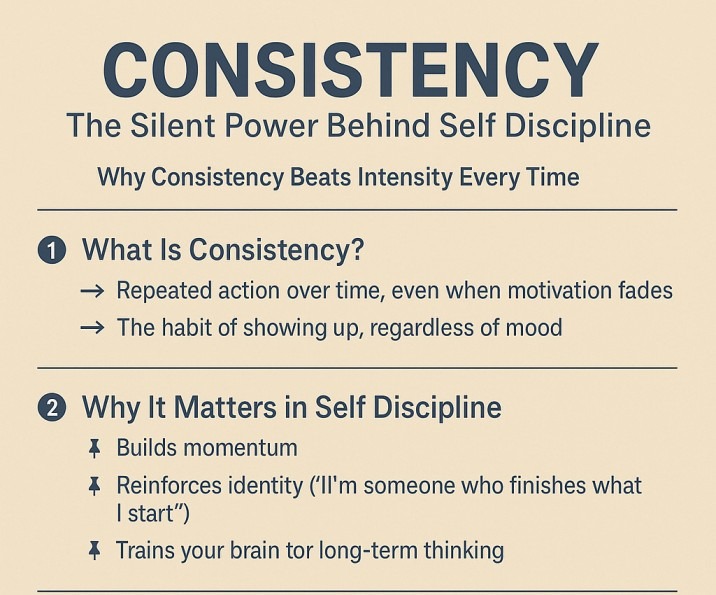Self discipline often appears in motivational quotes, self-help books, and TED talks, but despite its widespread mention, many still ask: what is self discipline, really? Is it just about saying “no” to temptation? Is it an inherited trait, or a skill that anyone can cultivate? The truth lies in its depth. Self discipline is far more than willpower—it is the foundational muscle of inner strength, quietly shaping the lives of high performers, consistent creators, and focused leaders across the globe.
In this in-depth exploration, we’ll uncover what is self discipline in both theory and practice. We’ll walk through its roots, its science, how it manifests in daily life, and why it’s arguably more important than raw talent or inspiration. If you’ve ever struggled with sticking to goals, managing time, or avoiding distractions, you’re not alone—and this deep dive is for you.
The True Definition: What Is Self Discipline?
Self discipline is a term often tossed around in productivity books and goal-setting seminars, but what is self discipline when we strip away the buzzwords? At its core, self discipline is the ability to control one’s emotions, behaviors, and impulses in service of long-term aspirations. It’s the capacity to delay gratification, resist temptations, and follow through on decisions even when motivation fades. But unlike what pop culture might imply, it doesn’t mean living a cold, joyless life full of restriction. Quite the opposite.
Beyond Denial: The Alignment of Values
People often mistake self discipline for self punishment. The stereotypical image is someone depriving themselves of fun, food, or sleep, simply to meet arbitrary standards. But true self discipline is never about suffering—it’s about alignment. It’s the ability to identify what you want most in life and align your present actions to support that vision. When your short-term choices consistently support your long-term identity, that’s self discipline in action.
The critical question, then, is not whether you can follow rules, but whether you can make value-driven choices when it matters most. This shift in thinking is key for anyone wondering how to be more disciplined in their personal or professional life.
The Myth of Superhumans
We often look at disciplined individuals—early risers, marathon runners, high achievers—and think they must possess something special. Maybe they were born with a stronger will. Maybe they just love discomfort. But that belief is not only inaccurate; it’s disempowering.
In reality, they’ve simply built systems that help them follow through, regardless of how they feel in the moment. They know how to be more disciplined because they’ve made it a conscious practice, not a personality trait. It’s not magic—it’s method.
Take the person who wakes up at 5 a.m. every day. They don’t necessarily love mornings. They’ve just prioritized what matters more than extra sleep—whether it’s writing, meditating, exercising, or having quiet time before the world wakes up. They’ve designed an environment where discipline feels like the natural choice.
Consistency Over Perfection

If you want to understand how to be more disciplined, stop chasing perfection. Discipline is not about doing everything right all the time—it’s about showing up consistently, even when conditions aren’t ideal. One of the biggest misconceptions is that if you miss a day, fall short of a goal, or get distracted, you’ve “failed” at discipline.
But in truth, those who master discipline are also those who know how to recover quickly from lapses. They don’t dwell on mistakes or wait for the “right time” to get back on track. They return to the plan with humility and clarity.
Discipline is like compound interest. Each small act of consistency builds upon the last. The person who meditates for five minutes a day will see more progress over time than the one who tries and fails to meditate perfectly for an hour once a week.
Emotional Management and Delayed Gratification
A major component of self discipline is emotional intelligence. It’s the ability to recognize when you’re triggered, bored, tired, or anxious—and still make choices aligned with your goals. This is especially important when learning how to be more disciplined, because emotions often drive impulsive behaviors.
You can’t control how you feel in every moment. But you can control whether you let those feelings dictate your actions. That’s where the real strength lies. Saying “no” to scrolling endlessly through social media or indulging in fast gratification is not easy—but every time you succeed, you’re teaching your brain that you are in charge.
This builds not only discipline, but also confidence.
Training the Muscle of Discipline
Here’s the good news: self discipline is not an innate gift—it’s a trainable muscle. Like lifting weights or learning a language, you get stronger the more you practice. But practice doesn’t mean overwhelming yourself with giant commitments. It means starting small and building up gradually.
If you’re wondering how to be more disciplined, don’t start with a drastic 4 a.m. wake-up routine or a completely overhauled diet. Start with one habit. One promise to yourself that you keep every day. That could be journaling for two minutes, drinking water before coffee, or spending 10 minutes on a side project.
Over time, those small wins stack up. They change your identity. You stop seeing yourself as someone who struggles with follow-through and start seeing yourself as someone who does what they say they’ll do.
The Decision to Choose Your Future Self
Ultimately, self discipline is the decision to choose your future self over your current urges. It’s a form of self-respect. And if you’re actively learning how to be more disciplined, you’re already on the right path.
Each decision you make in favor of growth—whether it’s choosing work over distraction, health over indulgence, or silence over emotional reaction—is a vote for the person you want to become. Those votes add up.
So, if you’re still asking how to be more disciplined, the answer is simpler than it seems: make one small promise to your future self—and keep it. Then do it again tomorrow.
The Psychology Behind It
Understanding what is self discipline also means understanding the mechanisms behind it. Psychologists define it as a subset of self-regulation—a complex mental process that involves the prefrontal cortex, the part of the brain responsible for planning, decision-making, and moderating social behavior.
When you’re disciplined, your brain is not merely resisting temptation. It’s recalibrating priorities. For example, when you choose to write that project proposal instead of scrolling through your phone, your brain is practicing executive function. And like a muscle, the more you practice it, the stronger it becomes.
Neuroscience tells us that self discipline isn’t fixed. Studies have shown that people can increase their willpower and regulation through habits, mindfulness, and even exercise. That’s right—your ability to be self disciplined is flexible, adaptable, and entirely trainable.
Self Discipline vs. Motivation: A Crucial Distinction

Many conflate the two, but there’s a critical difference between self discipline and motivation. Motivation is a feeling. It’s fleeting, unreliable, and often based on emotion or external factors. Self discipline, on the other hand, is a system—a structure you follow regardless of how you feel.
Ask any successful athlete or entrepreneur what got them to where they are, and chances are they’ll talk about routines, sacrifices, and hard days. Not endless waves of motivation. So, what is self discipline in this context? It’s the engine that keeps you going long after the thrill of starting something new has worn off.
Discipline is about action without permission from mood. That’s what makes it so powerful and so rare. It’s also why those who develop it often outperform more talented but less consistent peers.
The Daily Application of Self Discipline
While we now understand what is self discipline in concept, the real question is: how does it show up in real life?
Consider the person who exercises even when they don’t feel like it. Or the student who studies a little each day instead of cramming. The writer who finishes their book draft in quiet early mornings. The manager who practices restraint during tough meetings.
Self discipline appears in the tiny, quiet decisions. It’s not dramatic. It’s not flashy. But it builds momentum. Day after day, choice after choice, disciplined behavior compounds into extraordinary outcomes.
People often think of success as the result of grand strategy, but in most cases, it’s the result of small, disciplined actions repeated consistently.
Building Self Discipline: A Skill, Not a Trait
Another reason people wonder what is self discipline is because they assume it’s something you either have or you don’t. But like confidence, charisma, or patience—it can be cultivated.
You start by identifying your long-term goals. Then, you reverse-engineer the behaviors needed to support those goals. You create friction against the habits you want to break and remove friction from the habits you want to build.
And above all else, you practice forgiveness. Because self discipline is not about perfection. You will mess up. You will skip workouts, sleep in, procrastinate. But those who understand what is self discipline don’t let these moments derail them. They acknowledge the lapse, learn from it, and return to their path without drama.
The essence of inner strength is not in never falling—but in rising quickly, again and again.
Cultural Misunderstandings Around Self Discipline
In many cultures, self discipline is framed as a stoic, emotionless quality. The image of a monk or a strict military figure often comes to mind. But these stereotypes can obscure what is self discipline in its modern, nuanced form.
Self discipline does not mean suppressing emotions. It means understanding them—and choosing action anyway. It doesn’t mean eliminating pleasure, but delaying it for something greater. And it certainly doesn’t mean punishing yourself for every mistake.
In today’s world, self discipline may look like setting boundaries with technology, being intentional with your calendar, or saying no to opportunities that don’t align with your values. These are not rigid practices. They are acts of clarity, purpose, and courage.
Why Self Discipline Is the Foundation of Freedom
The Paradox of Discipline
Perhaps the most paradoxical part of our deep dive into what is self discipline is that discipline is often misunderstood. To many, it feels like a form of control, a set of rigid constraints that kill joy and spontaneity. But in truth, self discipline is the exact opposite—it’s the key to freedom.
Freedom doesn’t come from doing whatever we want whenever we feel like it. That kind of lifestyle often leads to burnout, missed opportunities, and a life reactive to circumstance. Real freedom—the kind that leads to fulfillment, clarity, and peace—comes from knowing how to be disciplined and consistent with your time, energy, and values.
Structure That Liberates
Consider this: when you build effective routines, you free your mind from decision fatigue. Instead of wasting mental bandwidth choosing what to eat, when to exercise, or how to work, you lean on structure. This creates mental space for deeper focus, creative thought, and emotional presence.
Knowing how to be disciplined and consistent in your daily habits allows you to automate excellence. You wake up ready. You move through the day with intention. You go to sleep satisfied. Freedom isn’t found in the absence of structure—it’s found in the mastery of it.
Energy and Clarity Through Routine
Self discipline extends to how we care for our physical and mental health. When you consistently nourish your body, prioritize sleep, and manage stress, you unlock reserves of energy and clarity. These aren’t luxuries—they’re outcomes of consistent self-care.
Ask any high performer or fulfilled individual how they manage it all, and the answer often involves how to be disciplined and consistent with health and habits. They don’t chase motivation. They rely on process.
Time as a Tool, Not a Tyrant

One of the most liberating aspects of discipline is its impact on time. Instead of constantly reacting to demands, disciplined people use time intentionally. They protect it. They schedule what matters most. They leave space—not just for work, but for rest, joy, and deep relationships.
Learning how to be disciplined and consistent with time management gives you the rare luxury of presence. You’re not rushing. You’re not drowning in unfinished tasks. You’re living on purpose, not just existing by default.
Chaos vs. Freedom: The Real Cost of Undisciplined Living
The undisciplined life may look carefree on the surface. But in reality, it often breeds chaos, regret, and stagnation. Procrastination leads to missed deadlines. Overindulgence turns into burnout. Distraction becomes a lifestyle.
If you’ve ever wondered how to be disciplined and consistent and felt overwhelmed, understand this: you’re not seeking perfection—you’re choosing peace. Because discipline isn’t punishment; it’s self-respect in action. It’s how you build a life you actually want to wake up to.
Long-Term Joy Through Discipline
A disciplined life may look structured, but within that structure lies immense joy. Discipline builds confidence. It gives you options. It creates space for spontaneity, because you’re not constantly playing catch-up.
Those who know how to be disciplined and consistent over time experience something few others do—the joy of progress without panic. They’ve chosen long-term satisfaction over short-term relief. And in doing so, they’ve discovered the ultimate freedom: control over their own destiny.
Self Discipline in a Distracted World
Never before has self discipline been more valuable than in today’s hyper-distracted society. With constant notifications, endless entertainment, and the illusion of multitasking, our ability to focus is under siege.
So, what is self discipline in the digital age? It’s the decision to be present. To log out. To pause. To work with intention. It is a radical rebellion against passive consumption and a return to conscious action.
To cultivate self discipline now is to protect your most valuable assets: time, attention, and autonomy. It is a modern superpower—quiet, rare, and immensely effective.
The Inner Strength That Shapes Your Identity
Ultimately, what is self discipline if not an expression of identity? It’s not just a skill; it’s a statement. Every time you make a disciplined choice, you reinforce the narrative of who you are and who you’re becoming.
Each early morning, each difficult conversation, each refusal to give in—these moments shape the self. The disciplined life is not just about achieving goals. It’s about living in alignment with your values. It’s about becoming someone you respect.
Discipline, therefore, is not just a means to an end—it is the way we build a life we’re proud of.
Conclusion
We set out to answer the question: what is self discipline? We’ve seen that it’s more than willpower. It’s more than denying yourself pleasures. It’s not a moral badge or a genetic lottery ticket. It is, at its deepest level, the art of honoring your commitments to yourself.
Self discipline is inner strength in motion. It’s a habit of action, a practice of self-respect, and a declaration of intent. In a world that often encourages shortcuts, the disciplined path is the one that leads to real, lasting fulfillment.
So if you’re asking what is self discipline today, know that the answer lies not just in reading about it—but in practicing it. Quietly. Consistently. Courageously.
Andrea Balint is a writer and researcher focused on human behavior, workplace psychology, and personal growth. Through her work at CareersMomentum, she explores how mindset, leadership, and emotional intelligence shape modern careers. With a background in communication and HR development, she transforms complex ideas into practical insights that help readers build clarity, confidence, and professional purpose.
